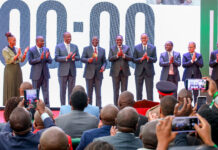Malaysian Prime Minister Anwar Ibrahim has announced the scrapping of tariffs on Kenyan beef and agricultural produce, a move he framed as a pragmatic assault on the “unreasonably high” cost of meat back home.
Speaking after a three-nation African tour that wrapped in Nairobi, Anwar said the decision would ease the burden on Malaysian consumers without undermining local farmers.
“The more important issue is not about removing or keeping the tariff but how do you get the prices low?” he told reporters, adding that the fiscal hit to his government would be “very minor, very small, very insignificant”.
The announcement came during a joint press conference with Kenyan President William Ruto, where the two leaders elevated bilateral ties to a “strategic partnership” spanning agriculture, digital tech and semiconductors.
Ruto hailed the tariff cuts as a “significant step” that would fling open Malaysian markets to Kenyan tea, coffee, flowers, avocados and beef, exports long hampered by barriers in a trade relationship skewed towards raw commodities from Nairobi and high-value imports like palm oil from Kuala Lumpur.
Malaysia already guzzles 150,000 tonnes of beef annually, mostly from India, Australia, Brazil and New Zealand; Kenya’s entry, Anwar stressed, would promote fair play for “economically less-advantaged nations” as long as halal standards from the Department of Islamic Development Malaysia (Jakim) and other checks are met.
Anwar, who doubles as finance minister, struck a note of equity amid Malaysia’s own cost-of-living squeeze. Beef prices there have ballooned amid global supply strains, prompting a pivot to diversified imports.
“As the cost of meat in Malaysia is high, we tend to expand and facilitate imports so that the cost to the people is lower,” he said, underscoring no need to “discriminate against poorer countries” if procedures are followed. The reassurance to local producers? Negligible disruption, given Kenya’s modest volumes.
Trade flows could soon thicken both ways. Kenya already snaps up RM1bn (£170m) worth of Malaysian palm oil yearly, redistributing it across Africa and beyond; Anwar floated similar deals for Proton cars, while Ruto eyed Malaysian expertise in energy transitions and semiconductors to turbocharge Kenya’s tech ambitions.
Four memorandums of understanding were inked, covering chambers of commerce, city twinning between Nairobi and Kuala Lumpur, and private sector links – all bound for Anwar’s cabinet on Friday for swift execution.
The leaders also recommitted to global financial reforms, with Ruto pushing for Africa’s two permanent UN Security Council seats, veto powers included.
Anwar urged his Investment, Trade and Industry Ministry to “take it up aggressively”, lamenting past failures to capitalise on such goodwill. “It would be a major loss if we don’t fully take advantage of this very friendly, supportive spirit from our friends in Africa,” he said.
For Kenya, the deal is a rare win in a tough export landscape, potentially injecting millions into rural economies battered by climate shocks.



















